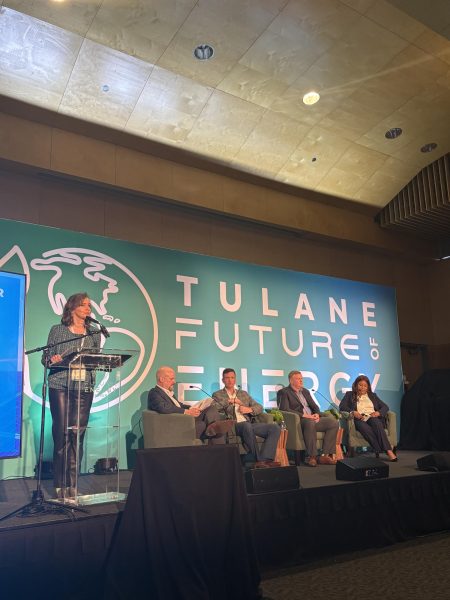
Global energy consumption is projected to increase by as much as 50% by 2050. In light of this, the energy industry is searching for ways to meet these demands while reducing emissions in the ongoing climate crisis.
Up to the task, leaders in the field gathered at Tulane University’s Future of Energy Forum, a collaborative space aiming to address this challenge.
Beginning on Nov. 13, the forum lasted over two days, packed with panels featuring high-profile speakers and pressing topics. The event was a collaboration across all 10 of Tulane’s schools and colleges, highlighting the interdisciplinary nature of the global energy transition.
Louisiana ranks third in natural gas production and fourth in total energy consumption in the United States, situating Tulane as the ideal setting to host this discussion. Provost Robin Forman, the moderator of a panel on AI in the energy sector, commented on the importance of Louisiana’s role in the energy sector.
“The energy industry is so crucial at all scales of our lives here in Louisiana,” Forman said. “It’s an enormous industry that defines our local and global economy.”
Forman laid out the issues in mind when rethinking the university’s power grid.
“One is the cost-effectiveness, and the other is the reliability. We do a lot of things here that require energy,” he said.
Economic implications of the energy transition were a dominant concern throughout the forum.
During a Thursday panel on the challenges and breakthroughs of decarbonization, partner at law firm Steptoe LLP Hunter Johnston discussed how the federal carbon capture tax credit created an economic benefit for Louisiana’s high emissions.
In 2023, Louisiana emitted nearly 144 million tons of greenhouse gases, of which carbon dioxide accounted for 89%.
“[As] an economic opportunity, the tax credit that is incentivizing this activity is $85 a ton. So, if you do the math, you recognize that this is about a $12 billion market opportunity for the state of Louisiana,” Johnston said.
Dustin Davidson, deputy secretary of the Louisiana Department of Energy and Natural Resources, sees this opportunity as a no-brainer.
“Why do we need carbon capture? It is important, but another way to think about it is, why not?”
Friday morning opened with a panel on energy justice, during which an audience member asked for advice on how to convince energy supermajors — the likes of Chevron, Exxon Mobil and Shell — to consider energy justice in their business practices. A partner at the law firm Womble Bond Dickinson, Alexandre de Gramont, said he believed they already do so.
“It’s not because they’re altruistic,” he said. “It’s because they don’t want to get sued… They don’t want bad publicity…they’re trying to fulfill their promises because they know that if they don’t, the investments are not going to work out.”
In contrast, Ken Ahmann, chief operating officer of Colusa Indian Energy Corp, offered a degree of skepticism.
“I’m not hopeful that corporate America is going to come to the rescue of the most impoverished and those people who need energy justice more than anyone else,” he said.
The multi-day event concluded with a direct discussion on a topic that, until then, remained at a polite distance: the evolution of the oil and gas industry by 2050.
Randall Ebner, former vice president and general counsel of Exxon Mobil Corporation. Ebner guided the panelists along a hypothetical advising journey, soliciting their guidance for key players in global energy, including corporate board members, the European Commission, Crown Prince of Saudi Arabia Mohammed bin Salman and Russian President Vladimir Putin.
Eric Smith, associate director of the Tulane Energy Institute, offered his theoretical advice to MBS regarding his role within Saudi Arabian crude oil and the Organization of the Petroleum Exporting Countries.
“Do more of what you’ve already been doing,” Smith said. “Building [liquefied natural gas] terminals with people from the Middle East, building new offshore developments in shallow water…my advice is to keep up the good work.”
Fellow panelist and partner at Bain and Company, Adam Frey, similarly emphasized a commitment to oil and gas.
“It’s a great time to be in the industry,” he said. “I would tell most people to be in the industry. If you take anything away from what I’m saying…[the industry’s] not going anywhere.”
Smith elaborated on the many industries and populations that depend on energy, a common emphasis throughout the forum.
“It’s a pillar of all rich north of the equator populations,” he said. “You mess with it at your peril.”


